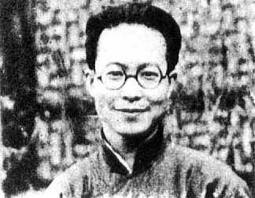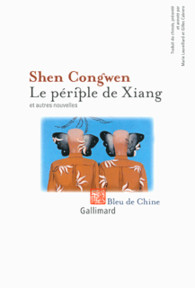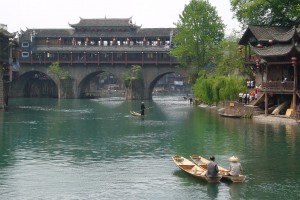 Shen Congwen is one of the greatest Chinese writers of the pre-war period. Hence the importance of the recent release in France of “The Journey to Xiang and other short stories”(1) that illustrates the talent of the writer in various styles.
Shen Congwen is one of the greatest Chinese writers of the pre-war period. Hence the importance of the recent release in France of “The Journey to Xiang and other short stories”(1) that illustrates the talent of the writer in various styles.
His life and career are totally atypical. His family is a blend of the dominant Han population and the Miao and Tujia minorities in the beautiful region of south-central China, Hunan. He enlisted in the army for a few years, then got a job at Peking University. He began to write successfully and married one of his students. During the war with Japan, he took refuge in Kunming, in the south-west of the country.
Rather conservative, he got closer to the left wing writers but without committing himself while being strongly critical towards the nationalists and the Kuomintang. At the end of the civil war, he was attacked by leading Communists and stopped writing fiction.
In 1953, his work was burned and banned in China in Taiwan, a performance!! It has since been republished.
Quoted by Mo Yan
This is one of the most prolific authors of this period, a master for many of them: the only writer of the previous generation quoted by Mo Yan during his speech to the Nobel Academy a few days ago. It is also the first Chinese writer who is said to have had a serious chance to win the Nobel Prize in 1988; he died a few months too early!
 A writer with a sophisticated style, very descriptive and often with a presentation a bit idyllic of his characters, certainly not involved in realism or social struggles.
A writer with a sophisticated style, very descriptive and often with a presentation a bit idyllic of his characters, certainly not involved in realism or social struggles.
But the hero of his work is the Xiangxi, this region of western Hunan around Fenghuang his hometown. Can be found in English, published by the Readers Digest “Beautiful Xiangxi” a superb book which compares the texts of Shen Congwen and photos of the region.
Fenghuang, the most beautiful small town in China?
His hometown is on the border between the settlements of the Han and the Miao minority areas. It is a region of fortresses, military colonies with even a wall to protect from the incursions of the Miaos. An isolated area until 1960 subject to the ruling of various warlords and to opium trafficking.
His life as a soldier was developed in his autobiography, “The soldier from Hunan” (Albin Michel 1992), translated by Isabelle Rabut who introduced the writer in France.
“The journey to Xiang”(1) which has been published is the story of a journey from Beijing to Fenghuang during the winter 1933-1934 when the author goes to see his dying mother. Sixty letters, written to his wife remained in Beijing, will be the basis of a collection published in 1936.
This superb text had been only partially translated into English (Panda 1982). As the author says in the preface to this edition:
“I wrote about the joys and sorrows, successes and failures of boatmen on small junks and their past and present. But what was difficult to express was their anxiety about their fate. Even their low standard of living was hard to maintain their common fate was to come to a sad end. “
 Boatmen, traffickers, prostitutes in a rather idyllic atmosphere mixed with loneliness and sadness; lively text, portraits, dialogues, descriptions of a beautiful area, a mixture of personal memories and the history of tumultuous events. Shen Congwen is worried about the future of the region; himself also has changed, he is no longer a child from Fenghuang …
Boatmen, traffickers, prostitutes in a rather idyllic atmosphere mixed with loneliness and sadness; lively text, portraits, dialogues, descriptions of a beautiful area, a mixture of personal memories and the history of tumultuous events. Shen Congwen is worried about the future of the region; himself also has changed, he is no longer a child from Fenghuang …
Short stories, a model for many writers:
These texts are praised by Chinese writers living in the United States (Ha Jin and Li Yiyun) and by authors from China or Taiwan. Many stories have been translated into English, some into French (Panda 1982) and especially two beautiful short stories, “Guisheng” and “Xiaoxiao”.
“The husband” is once more translated and by Marie Laureillard and this had to be done as it is the favorite short story of the author. The husband remained in the village, his wife is on the river on a boat, one of the many occasional prostitutes. He comes to see her, they can not bear the situation …
“Sansan” is also the nickname of his wife Zhang Zhaohe. A short story a little idyllic, a foreshadowing of his most famous novel “The Border Town” translated by Isabelle Rabut.
Sansan is the daughter of a miller, she meets a young city man who came to the countryside to improve his health; confrontation and misunderstanding between farmers and city dwellers, the difficulty of entering the adult world and a sad ending without tragedy.
“Qiaoxiu and Dongsheng” is a chapter of a novel which remained unfinished. The author describes the brutality of traditions, of relations between villagers, between clans, he tries to explain a world that will soon disappear.
The final part of this text “Truth is stranger than fiction” has unfortunately not been translated into French: the heroes are captured in a fight between clans, the outcome is bloody. This will be in 1948 the last literary text by Shen Congwen.
Bertrand Mialaret
(1) Shen Congwen, “Le périple de Xiang et autres nouvelles”, translated and introduced by Marie Laureillard and Gilles Cabrero. Bleu de Chine-Gallimard 2012, 300 pages, 25 Euros.





